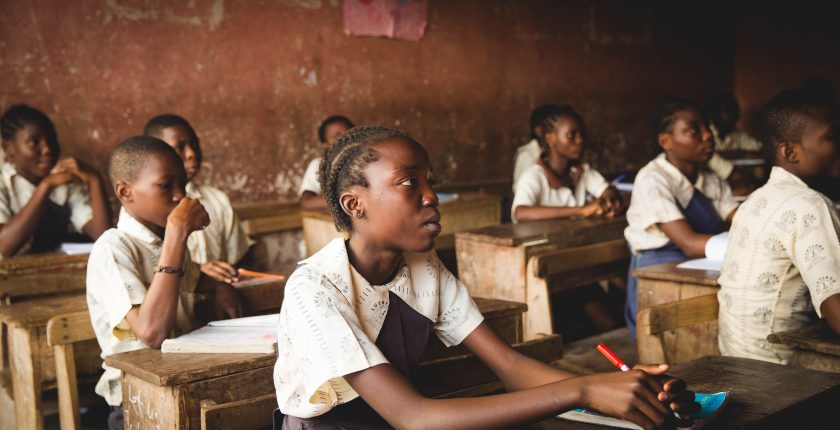The challenges and developments within Africa – a conversation with Red Sea Executive Search’s African Researcher Linda Walsh.
What are the developments in the international development sector within Africa that you find particularly exciting?
‘The government of Kenya are proposing that Children do not have to repeat an academic year if they fail. At the moment there are too many children repeating years and leaving school at a late age. This is detrimental in terms of development because it produces an inadequate learning environment where classrooms are made up of very diverse age range. It is not uncommon to have 14-18year olds in the same class. I believe that this is a positive change however measures will have to be put in place to ensure children do not fall behind and can catch up’
A debate: To repeat or to promote
The issue of whether repeating academic year is beneficial or not has been debated for a long time. Advocates for class repetition cite that repeating academic material can produce a more academically homogenous cohort which enables better teacher instruction (Aduda, Kodero and Sichari, pp37). However, many have pointed out the detriments of repeating years to children’s self-esteem which they argue prevents quality learning and correlates with dropping out of school. (Anderson, Jimerson, & Whipple, 2005).
No repetition policy and Covid-19
Kenya now, like many other countries, faces the challenge of maintaining quality education in the face of the global pandemic. On the 6th November 2021, the Kenyan state declared that learners will not have to repeat the academic year when entering back into the school system in January 2021 following the end of restrictions aimed to curb the effects of Covid-19. A rigorous academic plan aims to see the timely sitting of exams to guarantee transition into the next academic year. Education Cabinet Secretary George Magoha stated that although social distance will be a challenge Kenya needed to be on par with neighbouring countries in terms of education, despite the pandemic.
What is of concern about the future of the international development sector in Africa?
‘At the moment COVID-19 has hindered the development sector in terms of donations and budgets. Most African countries rely on AID and assistance from NGO’s. For example, Oxfam, which plays a major role in development, has had to close in 18 countries throughout 2020. Governments have attempted to create tax havens to assist in funding local NGOs, but this hasn’t worked. In response governments are now implementing various tax reforms putting people in a worse position at a time when they need more support.’
African states reform tax policies as NGOS withdraw
NGOs are facing challenges in funding programs causing many to reduce some of their work in Africa. This is linked to funding being withdrawn as individuals and governments within donor countries focus on mitigating the effects of the pandemic at home. Additionally, NGOs are less willing to send international personal for safety reasons, diminishing support on the ground where NGOs have not hired qualified staff in the area they operate within.
The issue is highlighting unsustainable hiring practices of some International NGOs, as well as a reliance of African states on international support to assist in their development. Because of this, African states are now looking at funding domestically by reforming the tax base thereby creating a more robust and independent funding system to underpin development. However, this comes at a cost to those who are already exposed to lower incomes due to salary cuts or job loss in the wake of the pandemic. Kenya, for example, has increased individual employment tax from 25% to 30%. (EY,2021)
Although the pandemic has shone a spotlight on unsustainable reliance on international aid which may produce better employment and funding practices in the long term, the short-term cost is distributed heavily towards the individual.
References
Wasonga, J,. (2nd August 2020) Repeating a school year will affect our children. https://www.standardmedia.co.ke/sunday-magazine/article/2001380920/repeating-a-school-year-will-affect-our-children
Aduda, P O,. Prof Kodero, H,. Sichari, M,. (Sept, 2019) The effect of class repetition on the academic performance of pupils in lower primary schools in Homa-Bay. Accessed at: http://repository.rongovarsity.ac.ke/bitstream/handle/123456789/2292/The%20%20effect%20%20of%20%20class%20%20repetition%20%20on%20%20the%20academic%20%20performance%20%20of%20%20pupils%20%20in%20%20lower%20%20primary%20schools%20in%20Homa-Ba.pdf?sequence=3&isAllowed=y
Gupta, S,. Redona, A,. (27th July 2020) COVID-19 and Seizing the Opportunity for Reforming Tax Expenditures in Africa. https://www.cgdev.org/blog/covid-19-and-seizing-opportunity-reforming-tax-expenditures-africa
Maalim, H,. (23rd June 2020) Opinion: NGOs are withdrawing from Africa when surge capacity is needed most. https://www.devex.com/news/opinion-ngos-are-withdrawing-from-africa-when-surge-capacity-is-needed-most-97528
UN, (2021) World Economic Situation and Prospects. https://www.un.org/development/desa/dpad/wp-content/uploads/sites/45/WESP2021_CH3_AFR.pdf
EY, (10th December 2020) Kenya proposes amendments to Income Tax and VAT Acts. https://www.ey.com/en_gl/tax-alerts/kenya-proposes-amendments-to-income-tax-and-vat-acts
Anderson, G. E., Jimerson, S. R., & Whipple, A. D. (2005). Student ratings of stressful
experiences at home and school: Loss of a parent and grade retention as superlative stressors. Journal of Applied School Psychology, 21, 1–20.

